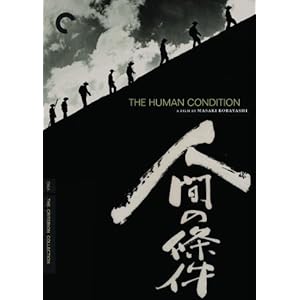
The Human Condition can be looked at as either a trilogy of three hour, two part films or a single nine hour, six part epic. Director Masaki Kobayashi also did Harakiri which is one of my favorite movies of all time, and while I didn't enjoy this as much, it was still an incredibly ambitious and mostly successful examination of what war does to people and values. The first film stars Tatsuya Nakadai, who was brilliant in Harakiri, as Kaji, a young man dedicated to socialist ideals in Japan. He gets exempted from fighting in World War II and placed in charge of a work camp for Chinese prisoners. He has to balance his duties to his country with the rights and desires of the prisoners, his own beliefs, and his love for his wife. He has trouble juggling everything, and by the end he finds himself overwhelmed by the conflicting elements and a much more broken man. It's kind of a slow movie, but there are enough stand-out scenes to help prop the rest of it up.
The second film finds Kaji now in the army, becoming skilled at his trade but still fundamentally opposed to war. This was my least favorite of the trilogy, as like many middle parts of the story, it relies entirely on the events within seeming important and interesting, and a lot of it is just him trying to protect his friends from his aggressive superiors and comrades and worrying about eventually going to war. It's not without its good points, I just thought the whole thing dragged a bit. It does climax pretty dramatically, with the largest single display of inhumanity in the trilogy, a battle that is effectively harrowing and tense. But the first couple hours didn't built to it in a very natural or dramatic way, it was just something and that they knew would eventually happen. The important bit is really how inhumanely soldiers treated each other, even ones on the same side, but it didn't quite grab me as much.
The third film is my favorite of the three, as it finds Kaji as an almost completely different person, not too terribly long after the series begins. Tatsuya Nakadai is an amazingly captivating actor, stealing the viewer's attention much like Toshiro Mifune, though less with a magnetic charisma and more with just an inescapable, fascinating intensity. The movie shows him and a few other stragglers from a battle, trying to make their way back home, battling starvation and fatigue as the Chinese countryside is still dangerous despite the end of the war. He takes point in trying to lead them home, but it becomes clear over time just what the war has done to him, and his desperation to return to his wife is as palpable as it is tragic. The movie is kind of just a major bummer, but it's also one that's hard to look away from, and shows a lot of growth in Nakadai as an actor and Masaki Kobayashi as a director. They'd collaborate on Harakiri a year later, and I think this helped prepare them for it.
AAAAAGGGHHHH
16 years ago


































No comments:
Post a Comment